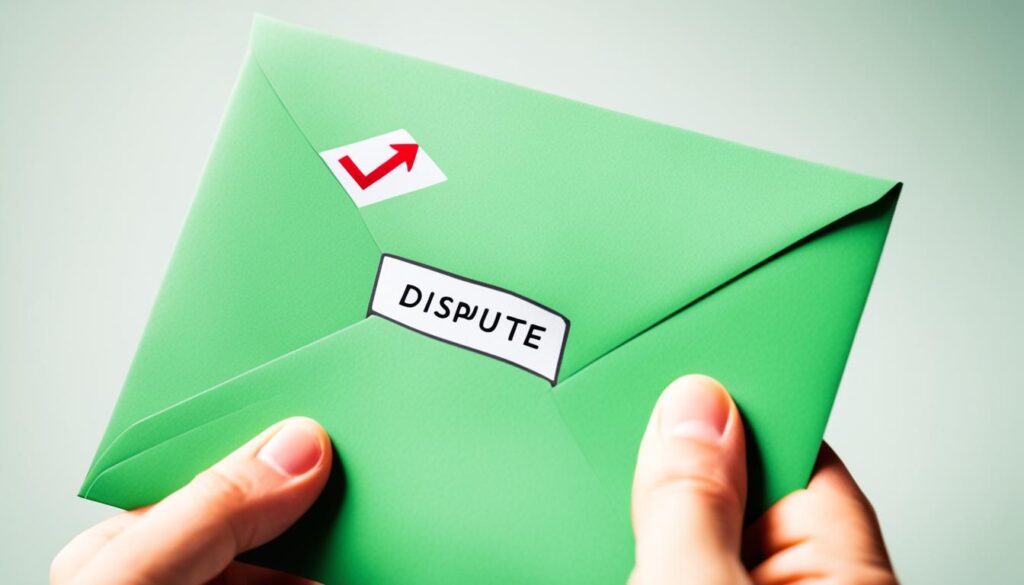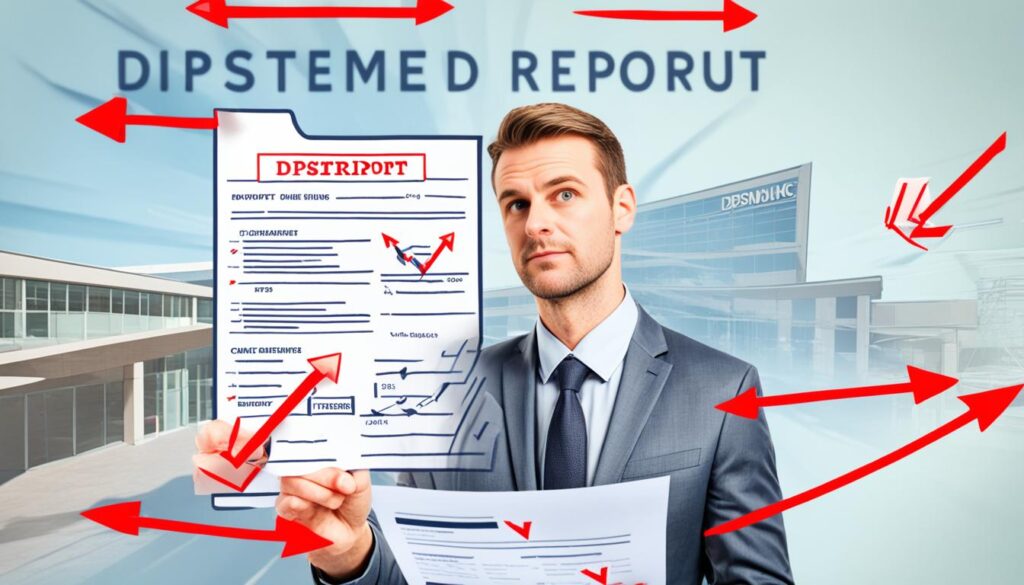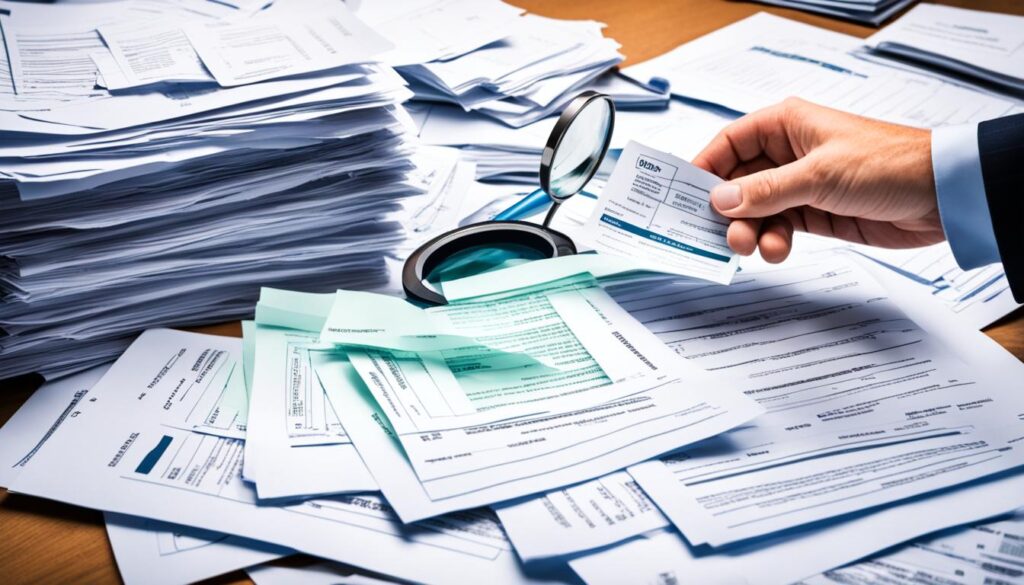Maintaining a healthy credit report is crucial for securing favorable loan terms, qualifying for credit cards, and even landing your dream job. However, credit reports can occasionally contain errors or inaccuracies that can negatively impact your creditworthiness. Fortunately, the Fair Credit Reporting Act (FCRA) empowers you to dispute these mistakes and get them corrected. In this comprehensive guide, we’ll walk you through the process of submitting a dispute letter to the major credit bureaus – Experian, Equifax, and TransUnion – to ensure your credit report reflects an accurate and truthful representation of your financial history.
Key Takeaways
- Understand the types of credit report errors you can dispute, such as incorrect account information, erroneous public records, and fraudulent accounts.
- Learn how to craft an effective dispute letter that clearly identifies the errors, provides supporting documentation, and requests their removal or correction.
- Explore the pros and cons of disputing credit report errors by mail, including the importance of sending your letter via certified mail with return receipt.
- Discover the steps the credit bureaus and information furnishers take to investigate and resolve your dispute, as well as what to do if your dispute remains unresolved.
- Familiarize yourself with your consumer rights under the FCRA and the steps you can take to protect your credit score after a successful dispute.
Understanding Credit Report Disputes
Maintaining an accurate credit report is crucial for your financial well-being. If you notice any errors or discrepancies in your credit report, you have the right to dispute them through a formal process with the credit bureaus. But what exactly is a credit dispute letter, and what types of credit report errors can you challenge?
What is a Credit Dispute Letter?
A credit dispute letter is a written request to the credit bureaus (Experian, Equifax, and TransUnion) to investigate and correct inaccurate, incomplete, or unverifiable information in your credit report. This formal process allows you to address credit report errors, such as accounts that don’t belong to you, incorrect account status, or identity theft-related issues.
What Credit Report Errors Can You Dispute?
- Accounts that do not belong to you
- Incorrect account status (e.g., closed accounts reported as open, or accounts reported as delinquent when they are not)
- Inaccurate payment history (e.g., late payments reported for accounts you paid on time)
- Erroneous personal information (e.g., incorrect name, address, or Social Security number)
- Identity theft-related issues (e.g., accounts opened fraudulently in your name)
- Debts that have been validated or discharged through the credit bureau dispute process
By understanding the types of credit report errors you can dispute, you can take proactive steps to maintain the accuracy and integrity of your credit profile, which is essential for good credit report health and accessing favorable financing options.
Identifying Errors Not Worth Disputing
When it comes to your credit report, not all errors are worth the time and effort to dispute. While it’s important to keep a close eye on your credit information and address any inaccuracies, some minor discrepancies may have a negligible impact on your credit score. The key is to focus your credit repair strategies on the significant errors that can truly affect your financial well-being.
For instance, if you spot a small, outdated balance on a closed account, it may not be worth the hassle of disputing it. However, if you find an account that doesn’t belong to you or an incorrect account status, those are the types of credit report errors that are worth taking the time to address through a formal dispute process.
Similarly, if you’re dealing with a case of debt validation, where a creditor is attempting to collect on a debt you don’t believe you owe, that’s a situation worth investigating and disputing if necessary. These types of errors can have a more substantial impact on your credit repair efforts and your overall creditworthiness.
“When it comes to your credit report, focus your dispute efforts on the errors that can significantly impact your financial future.”
By prioritizing the most impactful credit report errors and addressing them through the proper dispute channels, you can streamline your credit repair process and achieve the best possible outcomes for your creditworthiness.
Crafting an Effective Dispute Letter
When it comes to disputing errors on your credit report, a well-crafted dispute letter can be a powerful tool in your credit repair strategies. The Fair Credit Reporting Act (FCRA) gives you the right to challenge any inaccurate, incomplete, or unverifiable information on your credit report, and a meticulously written letter can help you get the results you need.
Information to Include in Your Dispute Letter
Your dispute letter should be clear, concise, and provide all the necessary details to support your case. Here’s what you should include:
- A clear identification of each item you are disputing, including the account number, date, and any other relevant details.
- A statement of the facts, explaining why the information is inaccurate, incomplete, or unverifiable.
- A request for the credit bureau to remove or correct the disputed information.
- Copies of any supporting documents, such as payment receipts, letters from creditors, or other evidence to back up your claims.
By following these guidelines and using sample dispute letter templates as a reference, you can craft an effective letter that gives you the best chance of successfully resolving credit report errors and improving your overall credit profile.
“A well-written dispute letter is a crucial step in any credit repair strategy. It’s your chance to set the record straight and get the information on your credit report corrected.”
Remember, persistence and attention to detail are key when it comes to disputing credit report errors. By taking the time to craft a thorough and persuasive dispute letter, you can take control of your credit and pave the way for a brighter financial future.
Pros and Cons of Disputing by Mail
When it comes to the credit bureau dispute process, mailing a dispute letter can have both advantages and disadvantages. Understanding these can help you determine the best approach for your specific situation and consumer rights.
Pros of Mailing a Credit Dispute Letter
- Establishes a paper trail: Mailing a dispute letter creates a tangible record of your communication with the credit bureaus, which can be crucial if further action is needed.
- Allows inclusion of supporting documents: By mailing your dispute, you can attach any relevant documents that support your case, such as copies of billing statements or payment records.
- Potential for faster resolution: In some cases, mailing a dispute letter can result in a quicker resolution compared to online dispute processes, as the credit bureaus may prioritize physical correspondence.
Cons of Mailing a Credit Dispute Letter
- Potential for delays: The mail-based dispute process can sometimes take longer than electronic methods, as the letter must be received, processed, and investigated by the credit bureaus.
- Requires close monitoring: When disputing by mail, you’ll need to closely track the progress of your dispute to ensure it is being addressed and resolved in a timely manner, in accordance with the Fair Credit Reporting Act (FCRA).
- Increased risk of lost or misplaced documents: There’s a higher chance of important documents being lost or misplaced when sent by mail, which could complicate the dispute process.
Ultimately, the decision to dispute by mail or through other channels will depend on your individual circumstances and preferences. Considering the pros and cons can help you make an informed choice that best aligns with your credit bureau dispute process and consumer rights.

| Pros of Mailing a Credit Dispute Letter | Cons of Mailing a Credit Dispute Letter |
|---|---|
| Establishes a paper trail | Potential for delays |
| Allows inclusion of supporting documents | Requires close monitoring |
| Potential for faster resolution | Increased risk of lost or misplaced documents |
Where to Mail Your Dispute Letter
When it comes to submitting a dispute letter to the credit bureaus, it’s crucial to know the correct mailing addresses for each major credit reporting agency. This information is essential for the credit bureau dispute process and ensuring your concerns are addressed efficiently.
Experian
To dispute an item on your Experian credit report, you can mail your dispute letter to the following address:
Experian
P.O. Box 4500
Allen, TX 75013
Equifax
For disputes related to your Equifax credit report, you should send your letter to:
Equifax
P.O. Box 740241
Atlanta, GA 30374
TransUnion
If you need to dispute an item on your TransUnion credit report, the mailing address is:
TransUnion
P.O. Box 2000
Chester, PA 19016-2000
Knowing the correct credit bureaus contact information is crucial for the credit bureau dispute process. By mailing your dispute letter to the appropriate address, you can ensure your concerns are addressed and your credit report is accurately updated.
How to Submit a Dispute Letter to Credit Bureaus
Submitting a dispute letter to credit bureaus is a crucial step in addressing any errors or inaccuracies on your credit report. Whether you’re dealing with how to submit a dispute letter to credit bureaus or navigating the credit bureau dispute process, understanding the proper procedure can help you effectively resolve issues and maintain the integrity of your credit profile.
To submit a dispute letter to the credit bureaus, follow these steps:
- Clearly identify each item you are disputing on your credit report. Be specific and provide the relevant details.
- State the facts about the disputed information and explain why you are disputing it. Provide a clear and concise explanation.
- Request that the disputed information be removed or corrected. Clearly communicate your desired outcome.
- Include copies of any supporting documents that help substantiate your claim.
- Send the dispute letter by certified mail with “return receipt requested” to create a paper trail. This will ensure that the credit bureau received your letter and provide proof of delivery.
By following these steps, you can effectively submit a dispute letter to credit bureaus and initiate the credit bureau dispute process. Remember, persistence and attention to detail are key when it comes to resolving credit report errors and protecting your financial wellbeing.
| Credit Bureau | Mailing Address |
|---|---|
| Experian | P.O. Box 4500, Allen, TX 75013 |
| Equifax | P.O. Box 740256, Atlanta, GA 30374 |
| TransUnion | P.O. Box 2000, Chester, PA 19016 |
By taking the time to properly submit a dispute letter to credit bureaus, you can help ensure the accuracy of your credit report and protect your financial health. Stay vigilant and proactive in managing your credit to achieve your long-term financial goals.

The Credit Bureau Dispute Process
The credit bureau dispute process plays a crucial role in maintaining the accuracy and integrity of your credit reports. Once you’ve submitted a dispute letter to the credit reporting companies, they must investigate the issues you’ve raised and work with the information furnishers to resolve any discrepancies.
The Credit Reporting Company Investigates
When a credit bureau receives your dispute letter, they are required by the Fair Credit Reporting Act (FCRA) to investigate the disputed information within 30 days. During this investigation, the credit bureau will forward your dispute and any supporting documentation to the company that provided the information (the “information furnisher”).
The Information Furnisher Makes Corrections and Notifies All Credit Reporting Companies
The information furnisher must then review the disputed information and determine if it is indeed inaccurate or incomplete. If the furnisher finds the information to be incorrect, they are obligated to notify all three major credit bureaus – Experian, Equifax, and TransUnion – to update your credit report accordingly.
| The Credit Bureau Dispute Process |
|---|
|
This comprehensive process ensures that your credit reports accurately reflect your financial history and protects your consumer rights. By understanding the credit bureau dispute process, you can take proactive steps to maintain the accuracy of your credit information and safeguard your financial well-being.
Handling Unresolved Disputes
If your credit report errors remain unresolved after going through the credit dispute process, you have a few options to consider. One key strategy is to request that the credit bureaus include a statement of the dispute in your credit file. This statement will be provided to anyone who requests your credit report in the future, allowing them to understand your side of the story.
Another powerful step you can take is to file a complaint with the Consumer Financial Protection Bureau (CFPB). This federal agency is tasked with protecting consumer rights and can intervene on your behalf if you are unsatisfied with the outcome of your dispute. By exercising your consumer rights through the CFPB, you can increase the pressure on credit bureaus and information furnishers to address your concerns.
“The Fair Credit Reporting Act (FCRA) provides consumers with important rights when it comes to disputing inaccuracies on their credit reports. Knowing how to effectively navigate this process is crucial for maintaining a healthy credit repair strategies.”
Persistence is key when dealing with unresolved credit report disputes. By utilizing the tools and resources available to you, such as including a dispute statement and filing CFPB complaints, you can ensure your voice is heard and your credit report accurately reflects your financial history.

Alternative Dispute Methods
When it comes to the credit bureau dispute process, you don’t have to rely solely on mailing a dispute letter. The Fair Credit Reporting Act (FCRA) provides consumers with additional options to dispute errors on their credit reports. Let’s explore some alternative dispute methods that can be just as effective.
Disputing Online
Many credit bureaus now offer the convenience of online dispute submission. This streamlined process allows you to identify and contest inaccuracies directly on their websites. The benefits of disputing online include:
- Faster processing times compared to mailing a letter
- Ability to upload supporting documentation digitally
- Automated tracking of the dispute status
Disputing by Phone
If you prefer a more personalized approach, you can also dispute credit report errors by calling the credit bureaus directly. This option may be helpful if you need assistance navigating the credit bureau dispute process or have complex issues to address. Keep in mind that phone disputes still require you to follow up in writing to protect your consumer rights.
“The Fair Credit Reporting Act (FCRA) gives you the right to dispute any information in your credit report that you believe is inaccurate or incomplete.”
Regardless of the method you choose, it’s important to be persistent and thorough in your credit bureau dispute process. By exploring alternative dispute options, you can effectively address discrepancies and take control of your financial future.
Protecting Your Credit After Disputes
After successfully disputing and correcting credit report errors, it’s crucial to continue monitoring your credit to ensure the issues don’t reappear. Regular review of your credit reports and setting up credit monitoring services can help you stay informed about any changes or new credit report errors.
Maintaining good credit practices is essential for fixing your credit score and preventing future problems. Here are some steps you can take to protect your credit after disputes:
- Review your credit reports regularly: Obtain your credit reports from the three major credit bureaus (Experian, Equifax, and TransUnion) and carefully review them for any new credit report errors.
- Sign up for credit monitoring: Consider enrolling in a credit monitoring service that will alert you to any changes in your credit profile, including potential new credit report errors.
- Keep track of your credit utilization: Ensure that your credit card balances remain low, as high utilization can negatively impact your credit score.
- Establish a budget and stick to it: Develop a budget that helps you manage your spending and maintain good credit repair strategies.
- Avoid new credit applications: Limit your applications for new credit, as each inquiry can temporarily lower your credit score.
By following these steps, you can protect your credit and maintain the improvements you’ve achieved through your credit dispute efforts.
“Monitoring your credit report and credit score is crucial for maintaining healthy finances and preventing future credit report errors.”

Remember, credit repair strategies don’t end with the dispute process. Ongoing vigilance and responsible credit management are key to ensuring the long-term fix credit score and protecting your financial well-being.
Consumer Rights and Fair Credit Reporting Act (FCRA)
As a consumer, you have certain rights when it comes to your credit information. The Fair Credit Reporting Act (FCRA) is a federal law that protects these rights, ensuring that credit bureaus and information furnishers (companies that provide information to credit bureaus) maintain accurate and fair credit reporting practices.
The FCRA grants you the right to dispute inaccurate or incomplete information on your credit report. This includes errors such as accounts that don’t belong to you, incorrect payment histories, or even identity theft. Credit bureaus are required to investigate these disputes and correct any verified errors.
- The FCRA ensures that credit bureaus and information furnishers maintain accurate and fair credit reporting practices.
- You have the right to dispute inaccurate or incomplete information on your credit report.
- Credit bureaus are legally obligated to investigate your disputes and correct any verified errors.
In addition, the FCRA also limits who can access your credit information and how it can be used. Employers, landlords, and lenders, for example, can only access your credit report with your consent. The law also requires credit bureaus to provide you with a free copy of your credit report annually, so you can monitor your credit and identify any potential issues.
| Key Consumer Rights under the FCRA | Description |
|---|---|
| Right to Dispute Inaccuracies | You can dispute any inaccurate or incomplete information on your credit report, and credit bureaus must investigate and correct verified errors. |
| Right to Access Credit Reports | You are entitled to a free copy of your credit report from each of the three major credit bureaus (Experian, Equifax, and TransUnion) every 12 months. |
| Limits on Credit Report Access | Employers, landlords, and lenders can only access your credit report with your consent, and they must disclose this access to you. |
By understanding your rights under the FCRA, you can take an active role in maintaining the accuracy of your credit information and protecting your consumer rights. This knowledge can be a powerful tool in ensuring fair and responsible credit reporting practices.
Conclusion
Submitting a dispute letter to the credit bureaus is a powerful tool in your quest to address inaccuracies and improve your credit profile. By understanding the process, identifying the right errors to dispute, and leveraging your consumer rights, you can take proactive steps to fix your credit score and enhance your financial well-being.
Whether you choose to dispute by mail or explore alternative methods, the key is to be thorough, persistent, and stay informed about your rights under the Fair Credit Reporting Act. By doing so, you can navigate the credit dispute landscape with confidence and ultimately achieve the credit health you deserve.
Remember, your credit report is a reflection of your financial history, and taking the time to ensure its accuracy can pay dividends in the long run. So, don’t hesitate to take the necessary steps to how to submit a dispute letter to credit bureaus, address credit report errors, and fix your credit score through effective credit repair strategies.
FAQ
What is a credit dispute letter?
What credit report errors can you dispute?
Are all credit report errors worth disputing?
What information should be included in a credit dispute letter?
What are the pros and cons of mailing a credit dispute letter?
Where should I send my credit dispute letter?
How does the credit bureau dispute process work?
What can I do if my dispute is not resolved?
What are my rights under the Fair Credit Reporting Act (FCRA)?
Source Links
- Sample Letter to Credit Bureaus Disputing Errors on Credit Reports – https://consumer.ftc.gov/articles/sample-letter-credit-bureaus-disputing-errors-credit-reports
- How do I dispute an error on my credit report? | Consumer Financial Protection Bureau – https://www.consumerfinance.gov/ask-cfpb/how-do-i-dispute-an-error-on-my-credit-report-en-314/
- How to Write a Credit Dispute Letter – NerdWallet – https://www.nerdwallet.com/article/finance/how-to-write-a-credit-dispute-letter-to-fix-credit-report-errors

